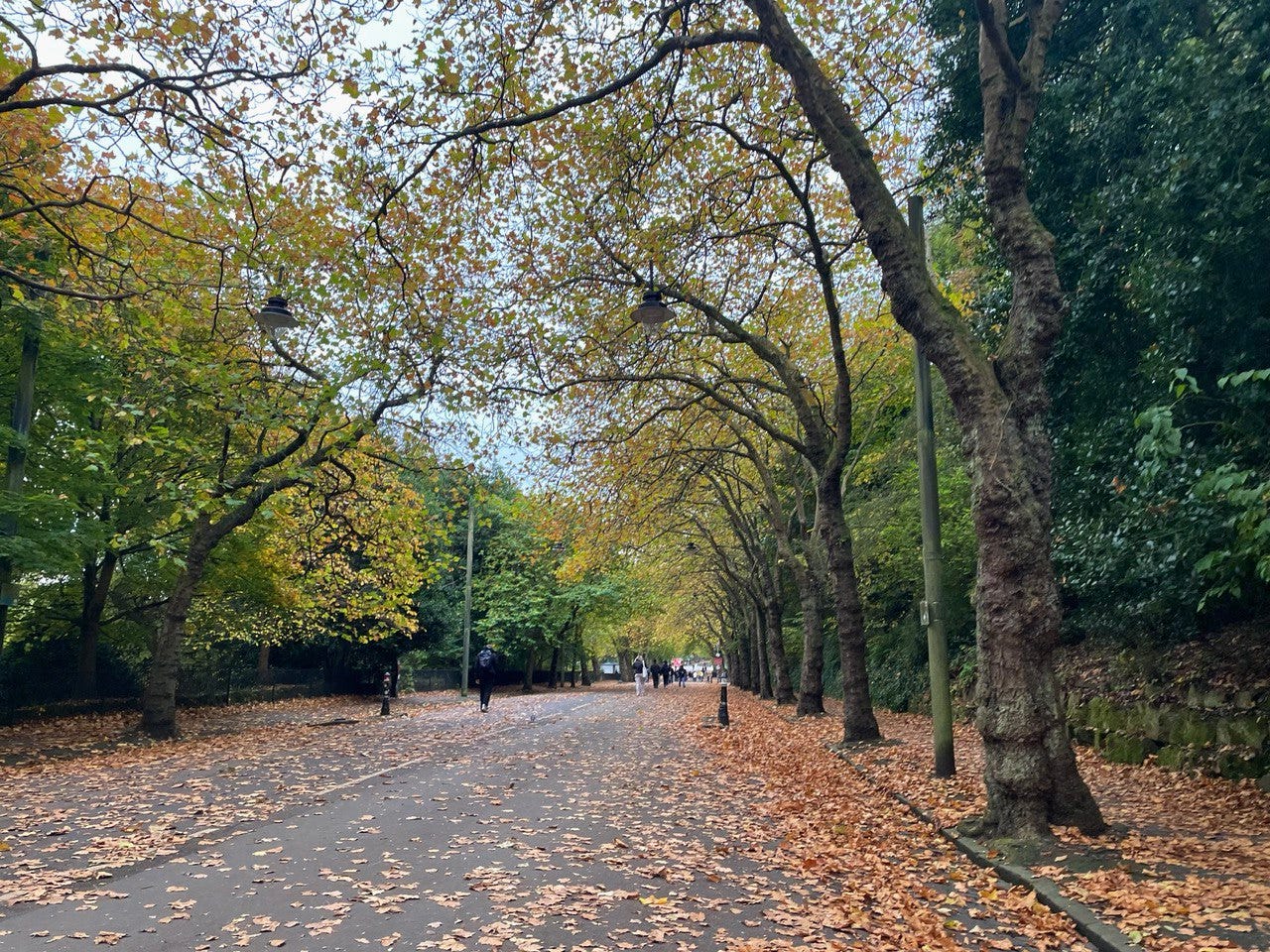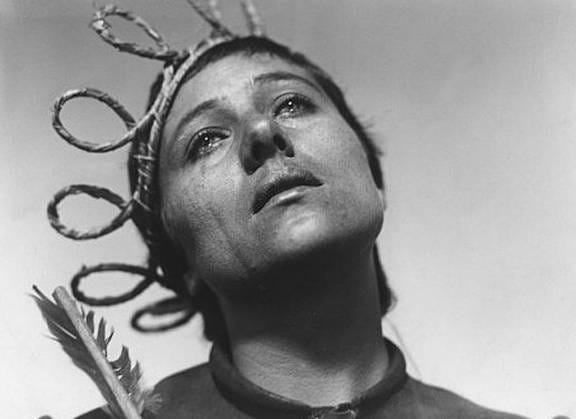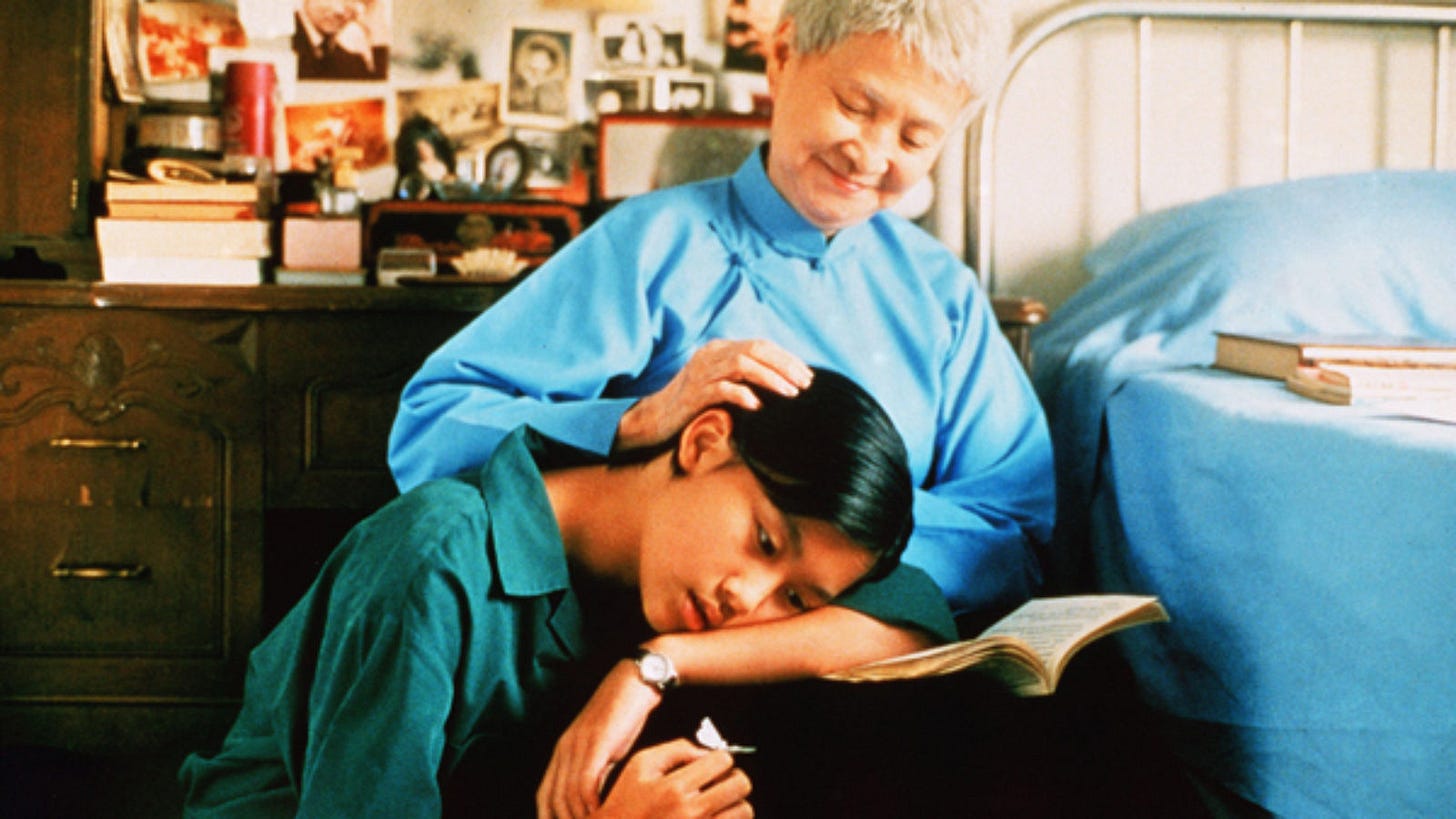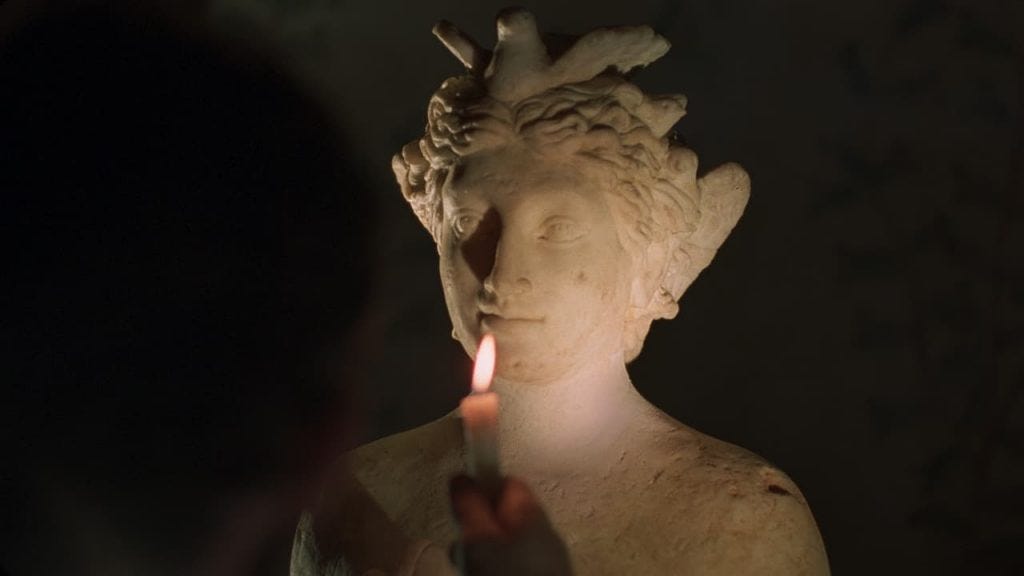During Han Kang’s presentation of Greek Lessons at Southbank Centre that I attended last year, she read an excerpt from her newly-translated book about the life and death of language.
She knows that no single specific experience led to her loss of language. Language worn ragged over thousands of years, from wear and tear by countless tongues and pens. Language worn ragged over the course of her life, by her own tongue and pen. Each time she tried to begin a sentence, she could feel her aged heart. Her patched and repatched, dried-up, expressionless heart. The more keenly she felt it, the more fiercely she clasped the words.
Han Kang’s work (specifically Greek Lessons) was something I kept returning to earlier this year whilst I was writing my dissertation about Theresa Cha’s Dictée.1 Although it seems like a better time than ever to talk about Han Kang with her recent Nobel prize win, I’ve actually had this post existing in fragments in my personal journal for a while now.
With the exception of the very short (and poorly written) piece that I had posted here over the past summer, I have not written anything since my grandma passed. Within the timeframe of a month after her passing, I was forced to write approximately 30,000 words for my degree’s final exams. I honestly don’t know how I survived the months of April and May and I don’t know how I managed to read and write so much during such an intense period of wanting to do nothing but sleep and cry. Writing– even the driest form in an analysis of Shakespeare’s tragicomedies– is a sacred act. There are countless essays about the art of writing that I could quote from (think Barthes, Cixous, Joyce, Didion etc) to back this up but I guess what I am trying to say is a little less intellectual than one probably expects. When I was younger, I always concealed my fear of public speaking with the fact that I wrote. I would say something along the lines of how because my words were so instilled within the process of pausing, erasing, and rephrasing, I could not bring myself to relay my ideas through a more immediate, spontaneous process of speech. Ironically enough, when a stranger looks at my CV, they are probably under the impression that I love leadership and talking (I hope). But anyone that has ever met me in real life knows how little I actually talk in social settings (I’m sorry for going completely non-verbal in every taxi this summer, Rhea). I don’t even mean all of this in a formal setting by the way. Obviously, most people hate sharing their unpolished, hastily formed ideas in seminars led by extremely qualified, well-spoken academics. But I mean this more in an everyday manner. Despite how much I love my friends, I never was the biggest fan of the catch-up portion of conversations. I hated having to answer how my summer was or what I’ve been up to even though I was so desperate to reconnect with them and listen to what they had been up to. In a way, a lot of my posts here are substitutes for my part in those kind of conversations. I love to talk about what I’ve been up to through my writing. I can deliberately pick out the best parts and manually delete the fluff and incoherent rambling to construct a poised version of my life; not even for an ironed out self-presentation purpose, but out of embarrassment over the gaps of silence and filler words that nullified my excitement over all the things that I actually wished to talk about. I’m sure everyone vaguely feels the same way and this is pretty much all in-line with most social media trends or whatever. Immediacy in the online world feels crude. All of this anxiety over external presentation of self, however, does not even scratch the surface of what I want to say.
Alongside my scattered thoughts on Han Kang existed a draft post about the red string in La Chimera. I collated a series of films that I wanted to write about in regards to this idea of fate and boundlessness but never got around to writing anything that I liked. I don’t have the draft of this post anymore, nor do I want to remember my heartbroken words over Aftersun (quite literally beating the horse to death), but I remember how I felt walking out of La Chimera at the Barbican. Despite my lack of expectations walking into the film (I only went to go see this because of how much Rhea loved it), I could not stop crying by the end of it. The ending to the film is just absolutely devastating (reminds me of the first time I saw Portrait of a Lady on Fire) and I could not stop thinking about it for weeks. Magic-realism being my favourite genre of film and literature aside, the parallels between haunting and the physical act of digging with the sentiments of love and memory in that film are so beautifully woven together. Perhaps due its slower pace, I didn’t really piece the two sides of Josh O’Connor’s character together until the very end– which in turn, hit me like a ton of bricks. Oddly enough, my mom didn’t love the film and I know some people would not agree with my reaction to the ending but like with most films I watch, I watched it at a time I really needed it.
Although I’ve only seen the film once, Yi Yi is what I tell when people ask me about my favourite film. Frankly speaking, I probably don’t remember all the details of it because it’s been a few years since I’ve seen it now. It was one of the first films that I had seen alone after moving to London and the way I felt after seeing it is probably how my dad felt after watching Tokyo Story in college. I remember calling my parents and my grandma after I got back to my dorm and telling them about it. Even though we don’t celebrate Lunar New Year in the traditional sense, it was still my first New Year away from Asia and something in me felt very sad to be very far away from home.
![Yi-Yi (A One and A Two) – [FILMGRAB] Yi-Yi (A One and A Two) – [FILMGRAB]](https://substackcdn.com/image/fetch/$s_!_8ov!,w_1456,c_limit,f_auto,q_auto:good,fl_progressive:steep/https%3A%2F%2Fsubstack-post-media.s3.amazonaws.com%2Fpublic%2Fimages%2F86e0d8ee-7809-4599-bfd7-53a8ac9df8ac_851x465.jpeg)
The speech at the end of Yi Yi made me cry when I watched the film three years ago at the BFI. But in retrospect, the version of me that cried while watching it reminds me of the advice that Aksel gives Julie in The Worst Person in the World, about how he wasted so much time worrying about what could go wrong but what did go wrong was never the things he worried about. I don’t know why I cried so hard during Yang Yang’s speech when I simply didn’t know what it would feel like to experience loss.
I’m sorry, Grandma. It wasn’t that I didn’t want to talk to you. I think all the stuff I could tell you… You must already know. Otherwise, you wouldn’t always tell me to ‘Listen!’ They all say you’ve gone away. But you didn’t tell me where you went. I guess it’s someplace you think I should know. But, Grandma, I know so little. Do you know what I want to do when I grow up? I want to tell people things they don’t know. Show them stuff they haven’t seen. It’ll be so much fun. Perhaps one day… I’ll find out where you’ve gone. If I do, can I tell everyone, and bring them to visit you? Grandma, I miss you. Especially when I see my newborn cousin who still doesn’t have a name. He reminds me that you always said you felt old. I want to tell him that I feel I am old, too.
But I couldn’t have known. And now I do know and I don’t know how to write or think about anything without my grief being at the centre of it all.
I turned twenty-three last month and contrary to every other birthday I’ve had in recent years, I feel vastly different. The age component is just an external mirror of it but, my life has gone through so much change this year that most days, I don’t know how to process any of it: how I ended up at law school when I had withdrawn my applications to law school when I was nineteen, why I’m writing this in a city 8656.66 km away from my hometown, or what I am supposed to feel or say when I meet new people that have no idea about the person that I am beneath this surface of change.
On a recent call with Rhea, I verbalised– for the first time in my life– my giving up of whatever it is that I thought I wanted when I first moved to this country. I told her about how stressful it was to write about films when I was trying to do it as a career instead of a hobby. And how great this summer had been as I worked 9-6, glued to a computer screen and sat in a spinny-chair in hopes that at least one lawyer would email me with instructions and PDFs to fill up my time at the office (and my worth). It sounded very sad and I was trying to convince myself that it was only sad if I thought it was sad– so therefore, it wasn’t sad. But it did sound sad and Rhea, being the nice friend she is, told me she was glad I was making sense of such a change in my career aspirations. I sounded like every person we had been making fun of for the past few years (I literally said the words: ‘I like being an NPC’). I am embarrassed and I probably should reread this part of this post and delete it. But I probably won’t because I think it’s a bit funny that I have fallen victim to this stereotypical corporate pipeline and that my best friend had to witness, yet again, another mental breakdown disguised as a eureka-esque moment. Ding ding ding! Anyways, I also probably won’t delete this part because it proves what has happened to my brain since I stopped writing and stopped having normal conversations with people.
As fun as this summer was and the wonderful people I have met since my grandma passed away, I don’t think I’ve had a real conversation with anyone since April. Or at least in my head. Nothing seems to make complete sense in my brain nor when I spit it out as words aloud. Rather, everything feels like a performative show of lack of emotion– like my previous post about how great this summer was (which is completely true but also void of how empty I felt for a great chunk of it)– and words that do not belong to me. I sound like a completely different person.
A couple of weeks ago, I ended up starting and finishing Sally Rooney’s new novel in a little over a day. I won’t reveal the contents of the novel but the way she writes about loss– unlike her previous works– feels a lot more real and complex. This was also the first novel I had read since the spring. It felt like I was in dialogue with the central characters of the novel (problematic trademark Sally Rooney relationships aside). Even as a big fan of her writing, I’ve never thought of or associated any of her works with comfort. If anything, her previous novels read in a very uncomfortable manner, making her writing borderline insufferable and definitely un-rereadable (Im talking about you, Conversations with Friends). But Intermezzo is her most mature writing to date. There’s a line that’s been making its rounds online that I have thought about every single day since I picked the novel up:
More and more complex, more difficult. Which is another way, she thinks, of saying: more life, more and more of life.
A part of me wants to go back and retract every statement I have made about what I know– or thought to have known– about life, just like how I loved Yi Yi so much without knowing anything about what Yang Yang meant in his eulogy. But life– and all the things that come with it like writing and feeling– is a palimpsest. Maybe I haven’t had a normal conversation since April or maybe my conversations since then just appear different because I feel so different. Like written about in Dictée, Greek Lessons, and Intermezzo, life ultimately isn’t defined by truth or what is perceived as real and unreal or anything that can be contained. I don’t know know what the flip side to this is and I don’t think any of these novels are preoccupied with defining it either.2

Anyways, happy Sunday and this is your sign to go pick up that Han Kang or Sally Rooney book you’ve been meaning to pick up.
After spending three years studying a degree I feel very distant from now, I do think that my dissertation is, academically and personally, my best piece of writing yet. I do not want it to rot in the archives of my near-death laptop so I will attach it here. She is my baby.
I am writing this as somewhat separate from the main body of the post because I don’t want it to be read as one but I never really expand on what I mean when I say things because I feel a bit stupid explaining myself. I guess I just wanted to write about my relationship with language during my time of grief. I thought I didn’t and couldn’t have normal conversations for a long time because I no longer felt like I had access to my usual state of mind and by extension, my vocabulary. But obviously I can’t use the same language if I am going through a brand new experience. A new thing that I don’t have the words to use to talk about. Does this make sense? I don’t know.




Probably my favourite writing of yours yet
This meant everything to me! Your writing moved me and I just love you, truly. I also just started a Han Kang book so the timing is everything. #Soulsisters. Sending love always!